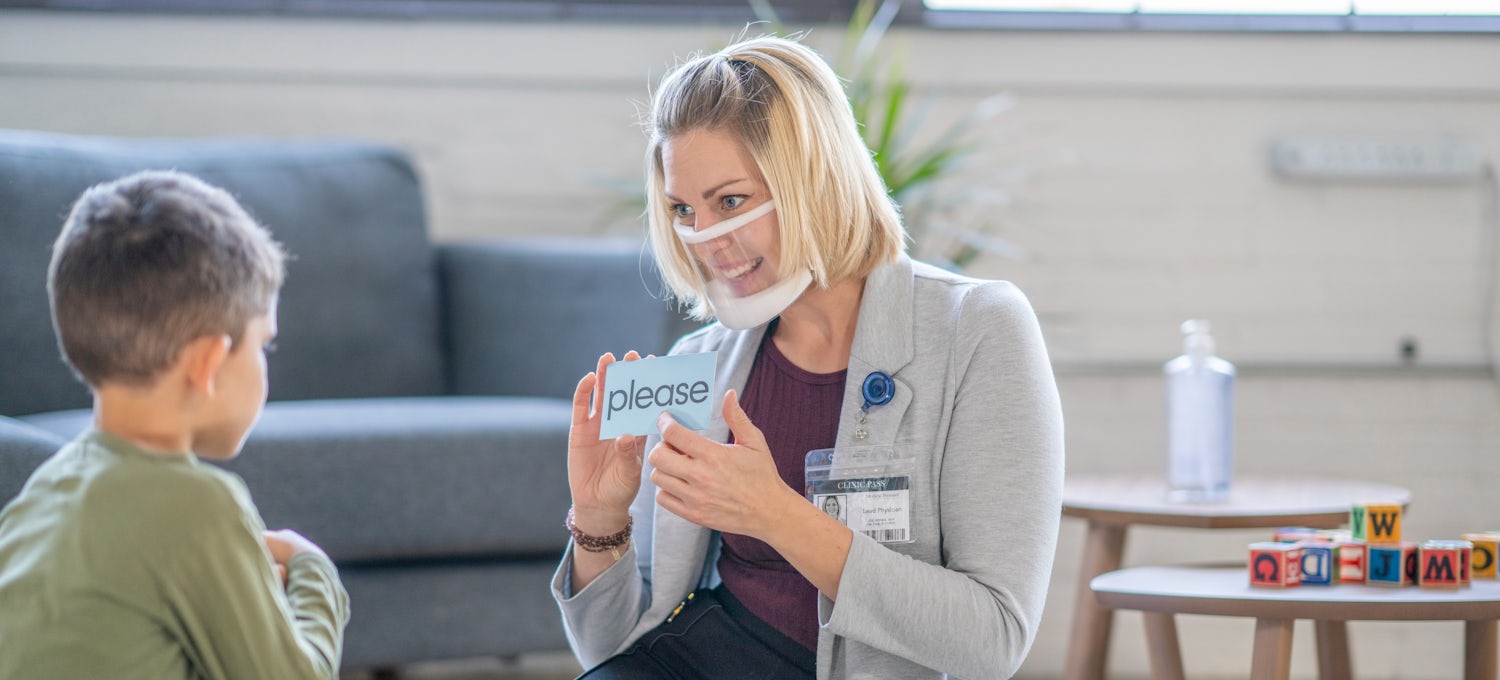How a Speech Pathologist Is Able to Help Develop Communication Skills
How a Speech Pathologist Is Able to Help Develop Communication Skills
Blog Article
Exactly How a Speech Pathologist Can Aid Improve Interaction Skills
Reliable communication is a keystone of professional and individual success, yet many people deal with difficulties that prevent their capacity to express themselves plainly. A speech pathologist is equipped to address these barriers through targeted assessment and intervention approaches tailored to every individual's demands. By utilizing evidence-based healing methods, they not only function to improve speech and language problems but additionally improve general communicative skills. Understanding the diverse function of a speech pathologist exposes just how their experience can change lives, welcoming a closer exam of the certain techniques and end results connected with their technique.
Comprehending Communication Conditions
Comprehending communication conditions is important for recognizing how they impact people' ability to reveal themselves and engage with others. Interaction conditions incorporate a broad variety of troubles that impact speech, language, and social interaction, commonly preventing reliable interaction. These disorders can arise from different variables, including neurological conditions, developmental delays, physical impairments, or emotional issues.
Speech disorders may manifest as problems in fluency, articulation, or voice production, impacting how words are pronounced or spoken. Language problems, on the various other hand, involve difficulties in understanding or utilizing language, which can hinder both non-verbal and verbal interaction. Social communication disorders are characterized by problems in the practical elements of interaction, such as taking kip down discussion or understanding social cues.
The effects of interaction disorders are extensive, influencing not just the individual's capacity to convey feelings and ideas but also their social partnerships, academic possibilities, and general lifestyle. Understanding of these conditions can foster compassion and support, encouraging effective methods for communication and interaction. Comprehending the intricacies of interaction disorders is a crucial step towards advertising inclusivity and dealing with the needs of those affected.
Duty of a Speech Pathologist
Speech pathologists regularly play a vital duty in identifying and treating communication conditions, employing a range of evidence-based methods tailored to each individual's needs. These experts deal with people throughout the lifespan, from kids with speech hold-ups to grownups recouping from strokes or traumatic brain injuries. Their knowledge incorporates a selection of interaction issues, consisting of expression, fluency, language, and voice conditions.
In restorative settings, speech pathologists use organized treatments designed to improve interaction skills. They might execute techniques such as speech exercises, language games, and social interaction training to promote enhancements in responsive and meaningful language capabilities. Speech Pathologist. Additionally, they inform clients and their families about effective interaction strategies and flexible methods to navigate daily interactions
Beyond straight therapy, speech pathologists collaborate with various other medical care teachers, caregivers, and specialists to guarantee a thorough approach to therapy. They advocate for clients by supplying resources and assistance, allowing individuals to accomplish their communication goals and improve their total lifestyle. As professionals in the area, speech pathologists are important in fostering reliable communication, promoting independence, and enhancing social engagement for those with interaction obstacles.
Analysis and Medical Diagnosis Refine
The analysis and diagnosis process conducted by speech pathologists usually involves a detailed examination to recognize communication disorders precisely. This process begins with a detailed medical history, where the medical professional gathers relevant information about the individual's medical, educational, and developmental history. Understanding the context of the individual's interaction difficulties is important for an exact medical diagnosis.
Complying with the medical history, speech pathologists utilize casual evaluations and standard tests to evaluate numerous aspects of interaction, including speech sound manufacturing, language understanding, meaningful language, and social interaction abilities. These assessments are customized to the individual's age and specific concerns, providing valuable data for analysis.
Observation is likewise a crucial element of the evaluation procedure, as it permits the clinician to see firsthand how the individual communicates in natural setups. Additionally, meetings with member of the family and teachers can give understanding right into the individual's communication difficulties throughout different environments.
When the assessment is total, the speech pathologist manufactures the searchings for to determine a diagnosis and recommend proper treatments. This detailed assessment process ensures that individuals obtain targeted assistance tailored to their one-of-a-kind communication demands, laying the foundation for efficient healing techniques.
Restorative Strategies and Strategies
Various healing methods and approaches are utilized by speech pathologists to deal with a range of communication conditions effectively. One widely made use of technique is articulation treatment, which concentrates on fixing speech seems via rep and aesthetic cues. This strategy is particularly useful for people with speech audio problems.
An additional effective strategy is language intervention, which enhances both expressive and responsive language abilities. This might entail interactive tasks that promote vocabulary development, sentence structure understanding, and conversational skills. In addition, speech pathologists frequently use social abilities training to improve pragmatic language abilities, making it possible for individuals to browse social communications extra efficiently.
Fluency shaping and stuttering alteration strategies are specifically created to assist those experiencing fluency disorders. These approaches help clients develop smoother speech patterns and manage the psychological and physical elements of stuttering.
Moreover, alternate and augmentative communication (AAC) systems are used for people with severe interaction problems. These systems, which can include gestures, symbols, or electronic tools, give crucial assistance for reliable communication.
Benefits of Speech Therapy

Furthermore, speech therapy can aid in creating important listening and comprehension abilities, promoting better interaction in conversations. People with cognitive-communication problems can likewise benefit, as therapy concentrates on enhancing memory and problem-solving capacities, crucial for efficient communication.
An additional important aspect is the psychological assistance offered throughout therapy sessions. Speech pathologists create a secure environment, motivating clients to overcome anxiousness and disappointment pertaining to their interaction issues. This assistance can result in boosted self-esteem and total Get More Information mental health.
Furthermore, very early intervention with speech therapy can protect against further difficulties, guaranteeing that people reach their full communicative capacity. Overall, the benefits of speech treatment extend beyond plain speech enhancement, favorably impacting different measurements of life for those affected by communication troubles.
Conclusion
In summary, speech pathologists play a critical role in attending to interaction disorders with analysis, diagnosis, and Check Out Your URL tailored restorative treatments. By using evidence-based techniques, these experts improve people' speech and language capacities, fostering enhanced clearness, fluency, and social communication abilities. The advantages of early intervention underscore the value of looking for aid from speech pathologists, as their know-how can significantly enhance communicative capacity, eventually causing better success in both individual and specialist spheres.

Speech pathologists frequently play an important function in detecting and treating communication conditions, using a range of evidence-based techniques tailored to each person's demands. As specialists in the field, speech pathologists are vital in promoting reliable interaction, advertising dig this independence, and enhancing social participation for those with communication difficulties.

Report this page